Ethical Dilemma Analysis in Healthcare Research: Case Study Report
VerifiedAdded on 2021/04/21
|9
|2339
|102
Report
AI Summary
This report provides an in-depth analysis of an ethical dilemma in healthcare research, focusing on a case where researchers Justin and Daisy incentivized participants with money to continue their study. The report examines the ethical implications of this action, highlighting breaches of key principles such as autonomy (participants participating under duress), fidelity (researchers not being faithful to participants' decisions), and veracity (deception regarding the research). The analysis incorporates ethical theories like deontology and virtue ethics to assess the researchers' motives and actions. The report discusses the impact of these ethical violations on informed consent, research integrity, and the reliability of the study's findings. It also considers the implications for patient care and the potential for fraud. The report concludes by recommending an ethical committee review of the research and acknowledges the conflict between the study's potential benefits and the ethical breaches. References are also provided.
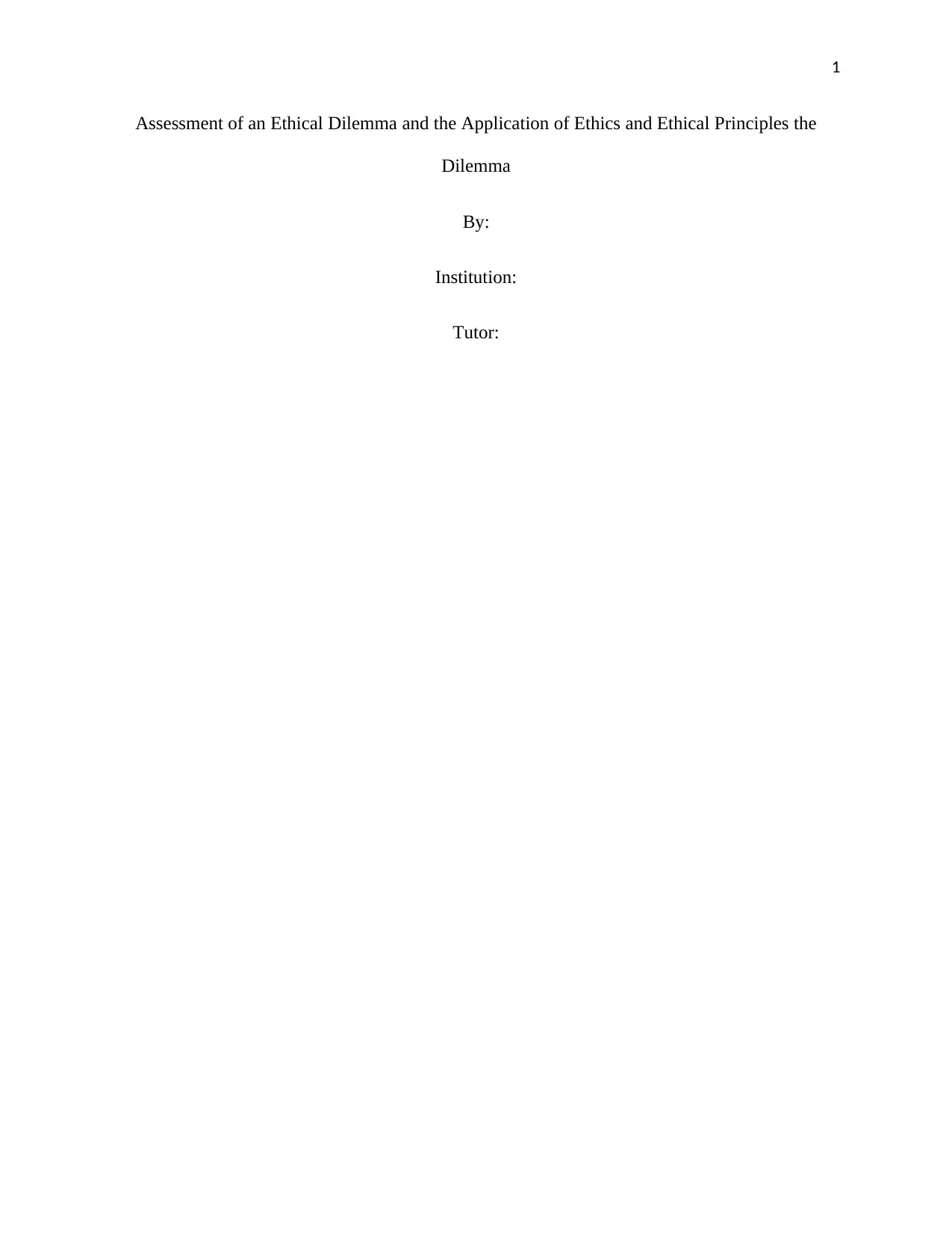
1
Assessment of an Ethical Dilemma and the Application of Ethics and Ethical Principles the
Dilemma
By:
Institution:
Tutor:
Assessment of an Ethical Dilemma and the Application of Ethics and Ethical Principles the
Dilemma
By:
Institution:
Tutor:
Paraphrase This Document
Need a fresh take? Get an instant paraphrase of this document with our AI Paraphraser
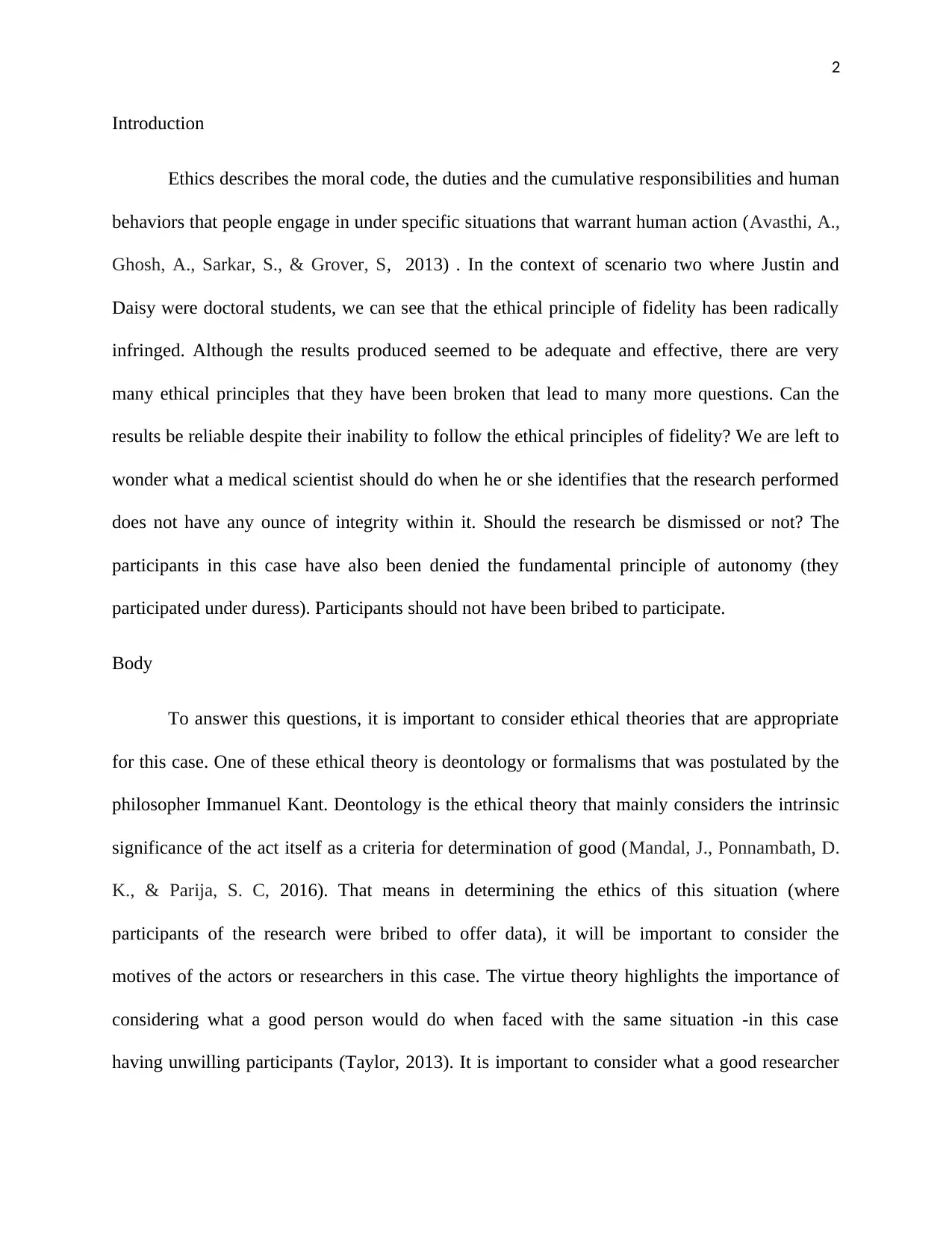
2
Introduction
Ethics describes the moral code, the duties and the cumulative responsibilities and human
behaviors that people engage in under specific situations that warrant human action (Avasthi, A.,
Ghosh, A., Sarkar, S., & Grover, S, 2013) . In the context of scenario two where Justin and
Daisy were doctoral students, we can see that the ethical principle of fidelity has been radically
infringed. Although the results produced seemed to be adequate and effective, there are very
many ethical principles that they have been broken that lead to many more questions. Can the
results be reliable despite their inability to follow the ethical principles of fidelity? We are left to
wonder what a medical scientist should do when he or she identifies that the research performed
does not have any ounce of integrity within it. Should the research be dismissed or not? The
participants in this case have also been denied the fundamental principle of autonomy (they
participated under duress). Participants should not have been bribed to participate.
Body
To answer this questions, it is important to consider ethical theories that are appropriate
for this case. One of these ethical theory is deontology or formalisms that was postulated by the
philosopher Immanuel Kant. Deontology is the ethical theory that mainly considers the intrinsic
significance of the act itself as a criteria for determination of good (Mandal, J., Ponnambath, D.
K., & Parija, S. C, 2016). That means in determining the ethics of this situation (where
participants of the research were bribed to offer data), it will be important to consider the
motives of the actors or researchers in this case. The virtue theory highlights the importance of
considering what a good person would do when faced with the same situation -in this case
having unwilling participants (Taylor, 2013). It is important to consider what a good researcher
Introduction
Ethics describes the moral code, the duties and the cumulative responsibilities and human
behaviors that people engage in under specific situations that warrant human action (Avasthi, A.,
Ghosh, A., Sarkar, S., & Grover, S, 2013) . In the context of scenario two where Justin and
Daisy were doctoral students, we can see that the ethical principle of fidelity has been radically
infringed. Although the results produced seemed to be adequate and effective, there are very
many ethical principles that they have been broken that lead to many more questions. Can the
results be reliable despite their inability to follow the ethical principles of fidelity? We are left to
wonder what a medical scientist should do when he or she identifies that the research performed
does not have any ounce of integrity within it. Should the research be dismissed or not? The
participants in this case have also been denied the fundamental principle of autonomy (they
participated under duress). Participants should not have been bribed to participate.
Body
To answer this questions, it is important to consider ethical theories that are appropriate
for this case. One of these ethical theory is deontology or formalisms that was postulated by the
philosopher Immanuel Kant. Deontology is the ethical theory that mainly considers the intrinsic
significance of the act itself as a criteria for determination of good (Mandal, J., Ponnambath, D.
K., & Parija, S. C, 2016). That means in determining the ethics of this situation (where
participants of the research were bribed to offer data), it will be important to consider the
motives of the actors or researchers in this case. The virtue theory highlights the importance of
considering what a good person would do when faced with the same situation -in this case
having unwilling participants (Taylor, 2013). It is important to consider what a good researcher
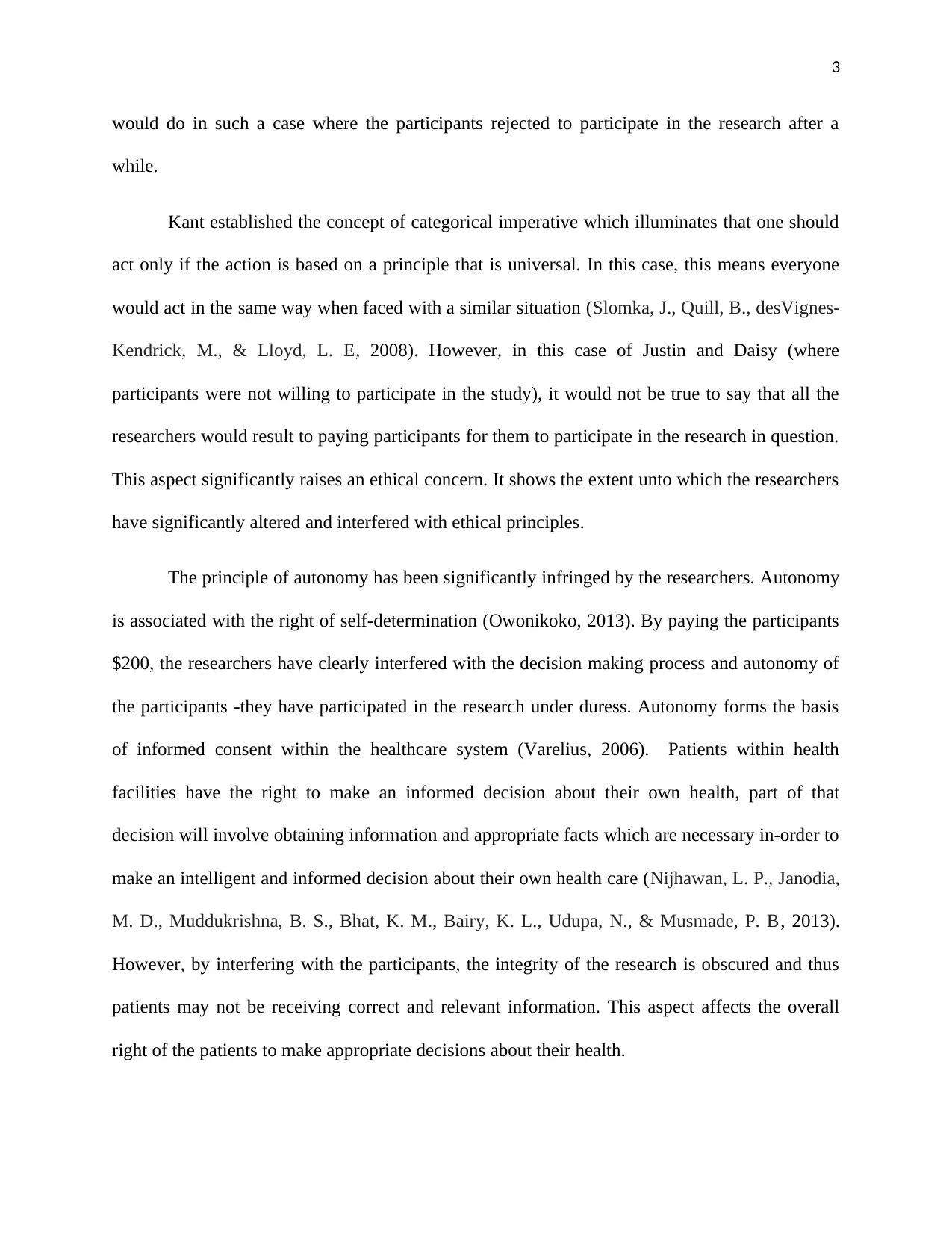
3
would do in such a case where the participants rejected to participate in the research after a
while.
Kant established the concept of categorical imperative which illuminates that one should
act only if the action is based on a principle that is universal. In this case, this means everyone
would act in the same way when faced with a similar situation (Slomka, J., Quill, B., desVignes-
Kendrick, M., & Lloyd, L. E, 2008). However, in this case of Justin and Daisy (where
participants were not willing to participate in the study), it would not be true to say that all the
researchers would result to paying participants for them to participate in the research in question.
This aspect significantly raises an ethical concern. It shows the extent unto which the researchers
have significantly altered and interfered with ethical principles.
The principle of autonomy has been significantly infringed by the researchers. Autonomy
is associated with the right of self-determination (Owonikoko, 2013). By paying the participants
$200, the researchers have clearly interfered with the decision making process and autonomy of
the participants -they have participated in the research under duress. Autonomy forms the basis
of informed consent within the healthcare system (Varelius, 2006). Patients within health
facilities have the right to make an informed decision about their own health, part of that
decision will involve obtaining information and appropriate facts which are necessary in-order to
make an intelligent and informed decision about their own health care (Nijhawan, L. P., Janodia,
M. D., Muddukrishna, B. S., Bhat, K. M., Bairy, K. L., Udupa, N., & Musmade, P. B, 2013).
However, by interfering with the participants, the integrity of the research is obscured and thus
patients may not be receiving correct and relevant information. This aspect affects the overall
right of the patients to make appropriate decisions about their health.
would do in such a case where the participants rejected to participate in the research after a
while.
Kant established the concept of categorical imperative which illuminates that one should
act only if the action is based on a principle that is universal. In this case, this means everyone
would act in the same way when faced with a similar situation (Slomka, J., Quill, B., desVignes-
Kendrick, M., & Lloyd, L. E, 2008). However, in this case of Justin and Daisy (where
participants were not willing to participate in the study), it would not be true to say that all the
researchers would result to paying participants for them to participate in the research in question.
This aspect significantly raises an ethical concern. It shows the extent unto which the researchers
have significantly altered and interfered with ethical principles.
The principle of autonomy has been significantly infringed by the researchers. Autonomy
is associated with the right of self-determination (Owonikoko, 2013). By paying the participants
$200, the researchers have clearly interfered with the decision making process and autonomy of
the participants -they have participated in the research under duress. Autonomy forms the basis
of informed consent within the healthcare system (Varelius, 2006). Patients within health
facilities have the right to make an informed decision about their own health, part of that
decision will involve obtaining information and appropriate facts which are necessary in-order to
make an intelligent and informed decision about their own health care (Nijhawan, L. P., Janodia,
M. D., Muddukrishna, B. S., Bhat, K. M., Bairy, K. L., Udupa, N., & Musmade, P. B, 2013).
However, by interfering with the participants, the integrity of the research is obscured and thus
patients may not be receiving correct and relevant information. This aspect affects the overall
right of the patients to make appropriate decisions about their health.
⊘ This is a preview!⊘
Do you want full access?
Subscribe today to unlock all pages.

Trusted by 1+ million students worldwide
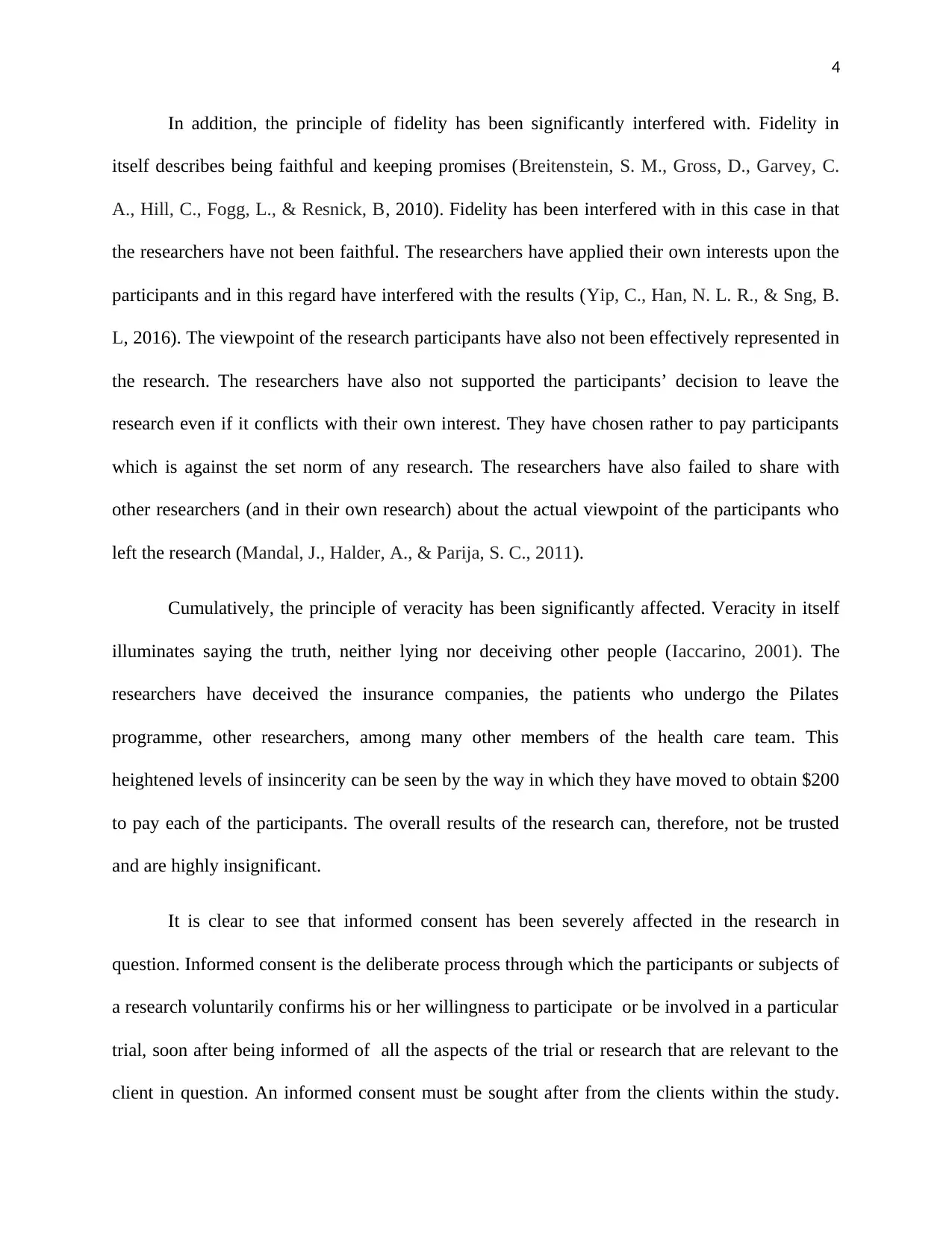
4
In addition, the principle of fidelity has been significantly interfered with. Fidelity in
itself describes being faithful and keeping promises (Breitenstein, S. M., Gross, D., Garvey, C.
A., Hill, C., Fogg, L., & Resnick, B, 2010). Fidelity has been interfered with in this case in that
the researchers have not been faithful. The researchers have applied their own interests upon the
participants and in this regard have interfered with the results (Yip, C., Han, N. L. R., & Sng, B.
L, 2016). The viewpoint of the research participants have also not been effectively represented in
the research. The researchers have also not supported the participants’ decision to leave the
research even if it conflicts with their own interest. They have chosen rather to pay participants
which is against the set norm of any research. The researchers have also failed to share with
other researchers (and in their own research) about the actual viewpoint of the participants who
left the research (Mandal, J., Halder, A., & Parija, S. C., 2011).
Cumulatively, the principle of veracity has been significantly affected. Veracity in itself
illuminates saying the truth, neither lying nor deceiving other people (Iaccarino, 2001). The
researchers have deceived the insurance companies, the patients who undergo the Pilates
programme, other researchers, among many other members of the health care team. This
heightened levels of insincerity can be seen by the way in which they have moved to obtain $200
to pay each of the participants. The overall results of the research can, therefore, not be trusted
and are highly insignificant.
It is clear to see that informed consent has been severely affected in the research in
question. Informed consent is the deliberate process through which the participants or subjects of
a research voluntarily confirms his or her willingness to participate or be involved in a particular
trial, soon after being informed of all the aspects of the trial or research that are relevant to the
client in question. An informed consent must be sought after from the clients within the study.
In addition, the principle of fidelity has been significantly interfered with. Fidelity in
itself describes being faithful and keeping promises (Breitenstein, S. M., Gross, D., Garvey, C.
A., Hill, C., Fogg, L., & Resnick, B, 2010). Fidelity has been interfered with in this case in that
the researchers have not been faithful. The researchers have applied their own interests upon the
participants and in this regard have interfered with the results (Yip, C., Han, N. L. R., & Sng, B.
L, 2016). The viewpoint of the research participants have also not been effectively represented in
the research. The researchers have also not supported the participants’ decision to leave the
research even if it conflicts with their own interest. They have chosen rather to pay participants
which is against the set norm of any research. The researchers have also failed to share with
other researchers (and in their own research) about the actual viewpoint of the participants who
left the research (Mandal, J., Halder, A., & Parija, S. C., 2011).
Cumulatively, the principle of veracity has been significantly affected. Veracity in itself
illuminates saying the truth, neither lying nor deceiving other people (Iaccarino, 2001). The
researchers have deceived the insurance companies, the patients who undergo the Pilates
programme, other researchers, among many other members of the health care team. This
heightened levels of insincerity can be seen by the way in which they have moved to obtain $200
to pay each of the participants. The overall results of the research can, therefore, not be trusted
and are highly insignificant.
It is clear to see that informed consent has been severely affected in the research in
question. Informed consent is the deliberate process through which the participants or subjects of
a research voluntarily confirms his or her willingness to participate or be involved in a particular
trial, soon after being informed of all the aspects of the trial or research that are relevant to the
client in question. An informed consent must be sought after from the clients within the study.
Paraphrase This Document
Need a fresh take? Get an instant paraphrase of this document with our AI Paraphraser
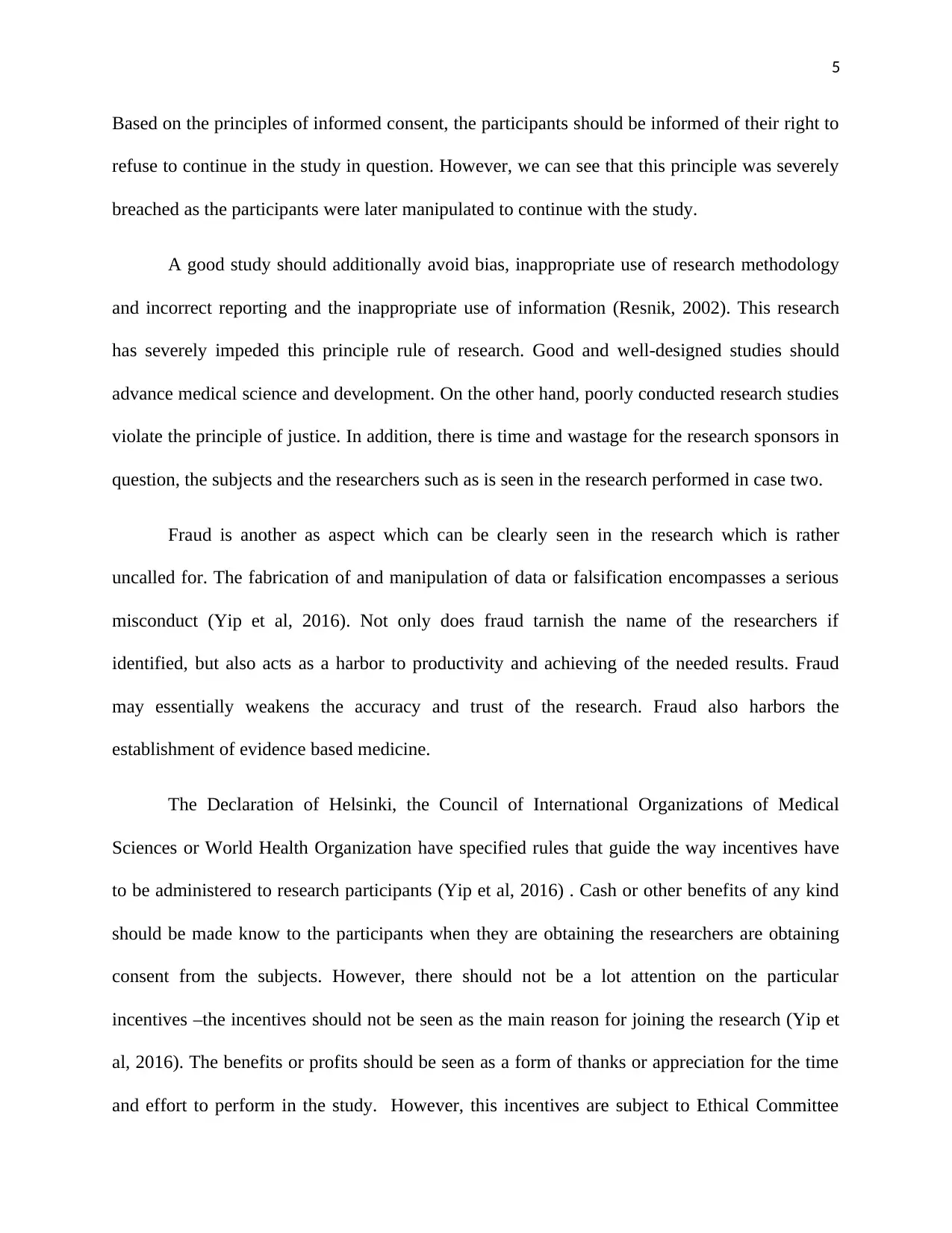
5
Based on the principles of informed consent, the participants should be informed of their right to
refuse to continue in the study in question. However, we can see that this principle was severely
breached as the participants were later manipulated to continue with the study.
A good study should additionally avoid bias, inappropriate use of research methodology
and incorrect reporting and the inappropriate use of information (Resnik, 2002). This research
has severely impeded this principle rule of research. Good and well-designed studies should
advance medical science and development. On the other hand, poorly conducted research studies
violate the principle of justice. In addition, there is time and wastage for the research sponsors in
question, the subjects and the researchers such as is seen in the research performed in case two.
Fraud is another as aspect which can be clearly seen in the research which is rather
uncalled for. The fabrication of and manipulation of data or falsification encompasses a serious
misconduct (Yip et al, 2016). Not only does fraud tarnish the name of the researchers if
identified, but also acts as a harbor to productivity and achieving of the needed results. Fraud
may essentially weakens the accuracy and trust of the research. Fraud also harbors the
establishment of evidence based medicine.
The Declaration of Helsinki, the Council of International Organizations of Medical
Sciences or World Health Organization have specified rules that guide the way incentives have
to be administered to research participants (Yip et al, 2016) . Cash or other benefits of any kind
should be made know to the participants when they are obtaining the researchers are obtaining
consent from the subjects. However, there should not be a lot attention on the particular
incentives –the incentives should not be seen as the main reason for joining the research (Yip et
al, 2016). The benefits or profits should be seen as a form of thanks or appreciation for the time
and effort to perform in the study. However, this incentives are subject to Ethical Committee
Based on the principles of informed consent, the participants should be informed of their right to
refuse to continue in the study in question. However, we can see that this principle was severely
breached as the participants were later manipulated to continue with the study.
A good study should additionally avoid bias, inappropriate use of research methodology
and incorrect reporting and the inappropriate use of information (Resnik, 2002). This research
has severely impeded this principle rule of research. Good and well-designed studies should
advance medical science and development. On the other hand, poorly conducted research studies
violate the principle of justice. In addition, there is time and wastage for the research sponsors in
question, the subjects and the researchers such as is seen in the research performed in case two.
Fraud is another as aspect which can be clearly seen in the research which is rather
uncalled for. The fabrication of and manipulation of data or falsification encompasses a serious
misconduct (Yip et al, 2016). Not only does fraud tarnish the name of the researchers if
identified, but also acts as a harbor to productivity and achieving of the needed results. Fraud
may essentially weakens the accuracy and trust of the research. Fraud also harbors the
establishment of evidence based medicine.
The Declaration of Helsinki, the Council of International Organizations of Medical
Sciences or World Health Organization have specified rules that guide the way incentives have
to be administered to research participants (Yip et al, 2016) . Cash or other benefits of any kind
should be made know to the participants when they are obtaining the researchers are obtaining
consent from the subjects. However, there should not be a lot attention on the particular
incentives –the incentives should not be seen as the main reason for joining the research (Yip et
al, 2016). The benefits or profits should be seen as a form of thanks or appreciation for the time
and effort to perform in the study. However, this incentives are subject to Ethical Committee
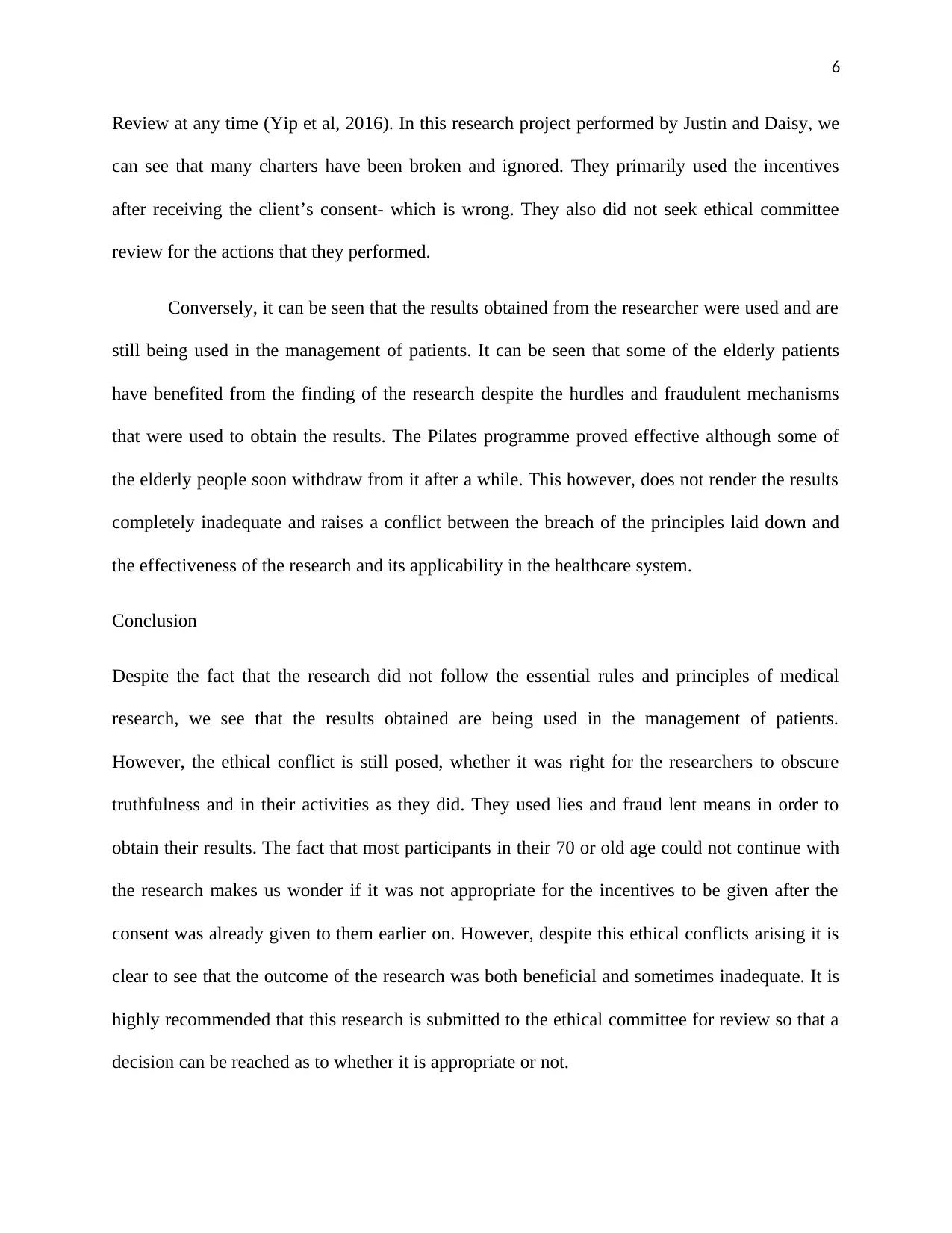
6
Review at any time (Yip et al, 2016). In this research project performed by Justin and Daisy, we
can see that many charters have been broken and ignored. They primarily used the incentives
after receiving the client’s consent- which is wrong. They also did not seek ethical committee
review for the actions that they performed.
Conversely, it can be seen that the results obtained from the researcher were used and are
still being used in the management of patients. It can be seen that some of the elderly patients
have benefited from the finding of the research despite the hurdles and fraudulent mechanisms
that were used to obtain the results. The Pilates programme proved effective although some of
the elderly people soon withdraw from it after a while. This however, does not render the results
completely inadequate and raises a conflict between the breach of the principles laid down and
the effectiveness of the research and its applicability in the healthcare system.
Conclusion
Despite the fact that the research did not follow the essential rules and principles of medical
research, we see that the results obtained are being used in the management of patients.
However, the ethical conflict is still posed, whether it was right for the researchers to obscure
truthfulness and in their activities as they did. They used lies and fraud lent means in order to
obtain their results. The fact that most participants in their 70 or old age could not continue with
the research makes us wonder if it was not appropriate for the incentives to be given after the
consent was already given to them earlier on. However, despite this ethical conflicts arising it is
clear to see that the outcome of the research was both beneficial and sometimes inadequate. It is
highly recommended that this research is submitted to the ethical committee for review so that a
decision can be reached as to whether it is appropriate or not.
Review at any time (Yip et al, 2016). In this research project performed by Justin and Daisy, we
can see that many charters have been broken and ignored. They primarily used the incentives
after receiving the client’s consent- which is wrong. They also did not seek ethical committee
review for the actions that they performed.
Conversely, it can be seen that the results obtained from the researcher were used and are
still being used in the management of patients. It can be seen that some of the elderly patients
have benefited from the finding of the research despite the hurdles and fraudulent mechanisms
that were used to obtain the results. The Pilates programme proved effective although some of
the elderly people soon withdraw from it after a while. This however, does not render the results
completely inadequate and raises a conflict between the breach of the principles laid down and
the effectiveness of the research and its applicability in the healthcare system.
Conclusion
Despite the fact that the research did not follow the essential rules and principles of medical
research, we see that the results obtained are being used in the management of patients.
However, the ethical conflict is still posed, whether it was right for the researchers to obscure
truthfulness and in their activities as they did. They used lies and fraud lent means in order to
obtain their results. The fact that most participants in their 70 or old age could not continue with
the research makes us wonder if it was not appropriate for the incentives to be given after the
consent was already given to them earlier on. However, despite this ethical conflicts arising it is
clear to see that the outcome of the research was both beneficial and sometimes inadequate. It is
highly recommended that this research is submitted to the ethical committee for review so that a
decision can be reached as to whether it is appropriate or not.
⊘ This is a preview!⊘
Do you want full access?
Subscribe today to unlock all pages.

Trusted by 1+ million students worldwide
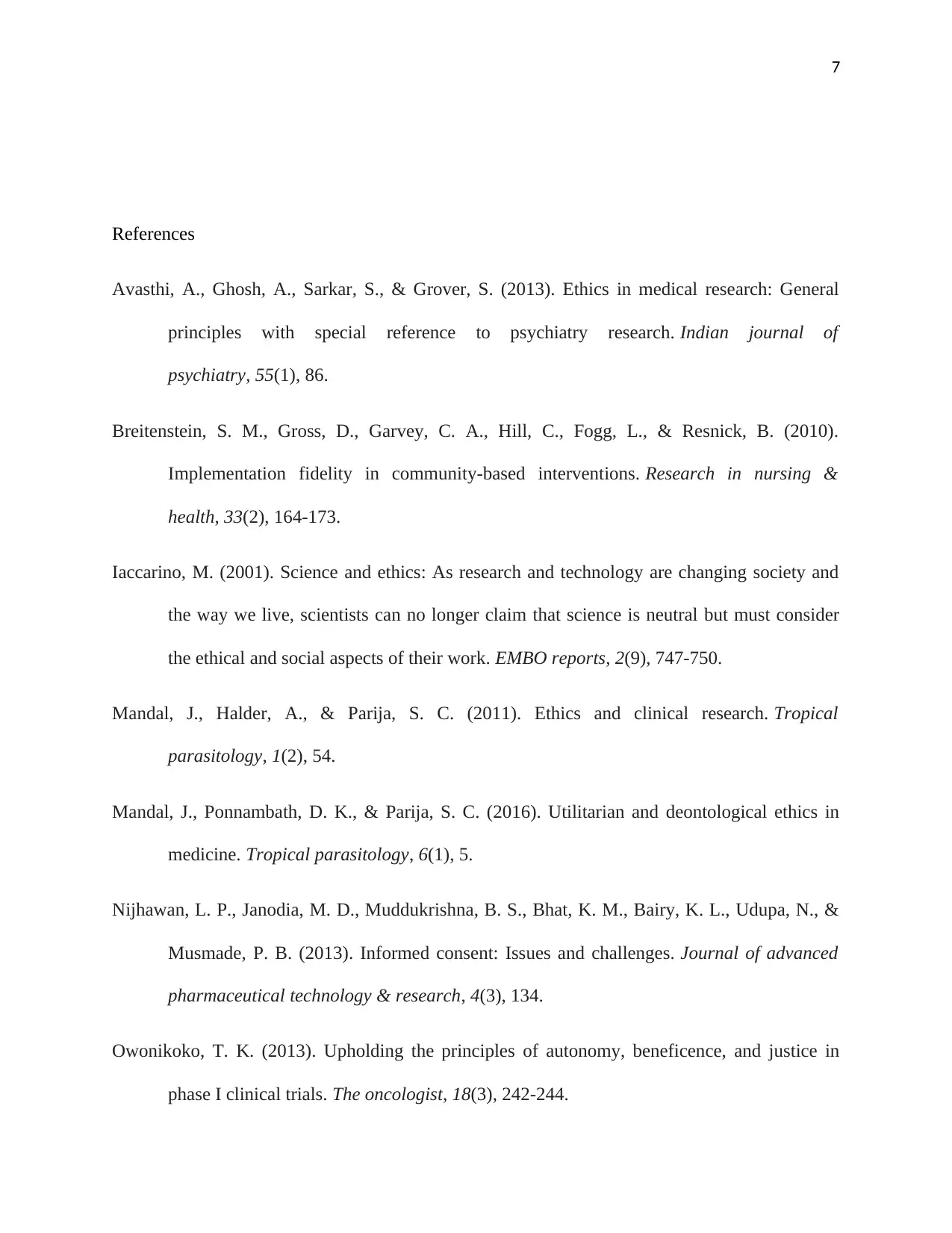
7
References
Avasthi, A., Ghosh, A., Sarkar, S., & Grover, S. (2013). Ethics in medical research: General
principles with special reference to psychiatry research. Indian journal of
psychiatry, 55(1), 86.
Breitenstein, S. M., Gross, D., Garvey, C. A., Hill, C., Fogg, L., & Resnick, B. (2010).
Implementation fidelity in community‐based interventions. Research in nursing &
health, 33(2), 164-173.
Iaccarino, M. (2001). Science and ethics: As research and technology are changing society and
the way we live, scientists can no longer claim that science is neutral but must consider
the ethical and social aspects of their work. EMBO reports, 2(9), 747-750.
Mandal, J., Halder, A., & Parija, S. C. (2011). Ethics and clinical research. Tropical
parasitology, 1(2), 54.
Mandal, J., Ponnambath, D. K., & Parija, S. C. (2016). Utilitarian and deontological ethics in
medicine. Tropical parasitology, 6(1), 5.
Nijhawan, L. P., Janodia, M. D., Muddukrishna, B. S., Bhat, K. M., Bairy, K. L., Udupa, N., &
Musmade, P. B. (2013). Informed consent: Issues and challenges. Journal of advanced
pharmaceutical technology & research, 4(3), 134.
Owonikoko, T. K. (2013). Upholding the principles of autonomy, beneficence, and justice in
phase I clinical trials. The oncologist, 18(3), 242-244.
References
Avasthi, A., Ghosh, A., Sarkar, S., & Grover, S. (2013). Ethics in medical research: General
principles with special reference to psychiatry research. Indian journal of
psychiatry, 55(1), 86.
Breitenstein, S. M., Gross, D., Garvey, C. A., Hill, C., Fogg, L., & Resnick, B. (2010).
Implementation fidelity in community‐based interventions. Research in nursing &
health, 33(2), 164-173.
Iaccarino, M. (2001). Science and ethics: As research and technology are changing society and
the way we live, scientists can no longer claim that science is neutral but must consider
the ethical and social aspects of their work. EMBO reports, 2(9), 747-750.
Mandal, J., Halder, A., & Parija, S. C. (2011). Ethics and clinical research. Tropical
parasitology, 1(2), 54.
Mandal, J., Ponnambath, D. K., & Parija, S. C. (2016). Utilitarian and deontological ethics in
medicine. Tropical parasitology, 6(1), 5.
Nijhawan, L. P., Janodia, M. D., Muddukrishna, B. S., Bhat, K. M., Bairy, K. L., Udupa, N., &
Musmade, P. B. (2013). Informed consent: Issues and challenges. Journal of advanced
pharmaceutical technology & research, 4(3), 134.
Owonikoko, T. K. (2013). Upholding the principles of autonomy, beneficence, and justice in
phase I clinical trials. The oncologist, 18(3), 242-244.
Paraphrase This Document
Need a fresh take? Get an instant paraphrase of this document with our AI Paraphraser

8
Resnik, D. B. (2002). Exploitation and the ethics of clinical trials. The American Journal of
Bioethics, 2(2), 28-30.
Slomka, J., Quill, B., desVignes-Kendrick, M., & Lloyd, L. E. (2008). Professionalism and ethics
in the public health curriculum. Public health reports, 123(2_suppl), 27-35.
Taylor, R. M. (2013). Ethical principles and concepts in medicine. In Handbook of clinical
neurology (Vol. 118, pp. 1-9). Elsevier.
Varelius, J. (2006). The value of autonomy in medical ethics. Medicine, Health Care and
Philosophy, 9(3), 377-388.
Yip, C., Han, N. L. R., & Sng, B. L. (2016). Legal and ethical issues in research. Indian journal
of anaesthesia, 60(9), 684.
Resnik, D. B. (2002). Exploitation and the ethics of clinical trials. The American Journal of
Bioethics, 2(2), 28-30.
Slomka, J., Quill, B., desVignes-Kendrick, M., & Lloyd, L. E. (2008). Professionalism and ethics
in the public health curriculum. Public health reports, 123(2_suppl), 27-35.
Taylor, R. M. (2013). Ethical principles and concepts in medicine. In Handbook of clinical
neurology (Vol. 118, pp. 1-9). Elsevier.
Varelius, J. (2006). The value of autonomy in medical ethics. Medicine, Health Care and
Philosophy, 9(3), 377-388.
Yip, C., Han, N. L. R., & Sng, B. L. (2016). Legal and ethical issues in research. Indian journal
of anaesthesia, 60(9), 684.

9
⊘ This is a preview!⊘
Do you want full access?
Subscribe today to unlock all pages.

Trusted by 1+ million students worldwide
1 out of 9
Related Documents
Your All-in-One AI-Powered Toolkit for Academic Success.
+13062052269
info@desklib.com
Available 24*7 on WhatsApp / Email
![[object Object]](/_next/static/media/star-bottom.7253800d.svg)
Unlock your academic potential
Copyright © 2020–2025 A2Z Services. All Rights Reserved. Developed and managed by ZUCOL.




